Did you know that one of the main reasons you can’t lose weight with PCOS is because of your hormones?
It’s true, and that’s why many women (and physicians) turn to Metformin to try and help with weight loss.
But just because it works for some people doesn’t mean it will necessarily work for YOU.
Find out why metformin helps with weight loss, but more importantly what works better and how to finally lose weight if you have PCOS.
Insulin & PCOS: Why It’s so Important
One of the most common medications prescribed for PCOS is metformin.
But, PCOS is a hormonal condition that results in weight gain, hair growth on the face, infertility, acne, and estrogen/progesterone imbalances.
So why is metformin, a medication used to lower blood sugar and treat insulin resistance, used to treat estrogen/progesterone imbalances in women?
The logic is quite simple:
Most of the symptoms of PCOS (all those listed above) stem from insulin resistance (1)!
In fact, many physicians recommend that ALL women with PCOS should be treated for insulin resistance regardless of what their fasting insulin and fasting blood sugar levels are.
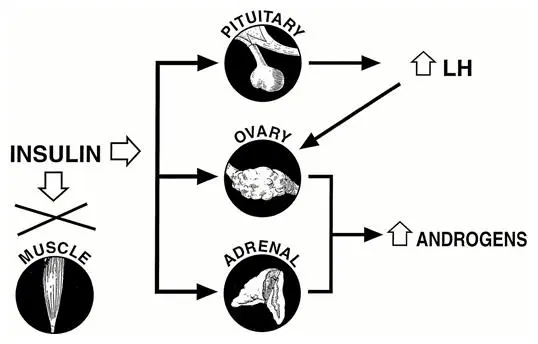
This means that the root cause of PCOS (at least the majority of it) is insulin resistance, and this is why metformin is so commonly used to treat it.
Insulin resistance causes a block of glucose uptake in your skeletal muscles which results in a lower metabolism (and weight gain), insulin also directly acts on your ovaries and adrenals increasing androgens like testosterone and DHEA.
It’s also the action of insulin on your pituitary that results in increased LH production which over-stimulates your ovaries resulting in the characteristic “cysts” of PCOS.
High levels of DHEA and testosterone lead to acne and hair growth (hirsutism).
But one simple question remains:
Does metformin actually work and does it cause weight loss?
The truth is that while insulin resistance is the underlying cause of PCOS, there are much better ways to treat this problem and it turns out that metformin is NOT the best medication to reduce blood sugar OR help with weight loss.
Despite this, it still has some uses and we will talk about those.
But first…
Does Metformin Help with Weight Loss?
So our main concern is whether or not metformin actually helps women with PCOS lose weight.
The truth is that it CAN result in weight loss, but in most patients, it WON’T result in weight loss.
First, let’s talk about how it CAN cause weight loss.
Metformin is a biguanide medication that acts through a number of mechanisms, but the most important one is the sensitization of your cells to insulin.
That means that metformin actually makes your body more SENSITIVE to the insulin that is already in circulation – and this is a good thing, we want this to happen.
Insulin is a hormone that is secreted from your body and it’s designed to help your body store glucose or blood sugar.
It does this by forcing any excess blood sugar straight into your fat cells.
This is a good thing in small amounts, but once you develop insulin resistance it becomes a big problem.
Basically what happens is your body pumps out insulin at higher levels than normal and insulin stays around longer than it should in your blood.
So the next time you have a meal, instead of that glucose being used as an energy source for your muscles, brain tissue, heart tissue, etc. it’s instead stuffed right into your fat cells – making you gain weight.
This mechanism is exactly why it’s so difficult for PCOS patients to lose weight.
This is also why low-calorie diets won’t work in the presence of insulin resistance, it doesn’t matter if you eat 1,000 calories if your insulin levels are high.
And this is also why metformin CAN help certain people with weight loss (even without changing their diet).
Studies have shown (2) that some patients with PCOS taking metformin (at various doses) may lose up to 4% of their body fat over an 8-month period:
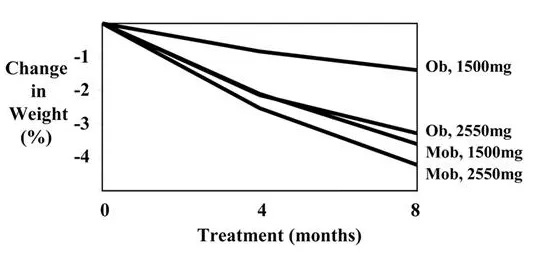
This graph outlines the various dosages of metformin and how certain patients lost weight.
You can see from this study the direct correlation between metformin dosing and weight loss over time.
Patients on 2500mg of metformin lost about twice as much weight as patients only taking 1,500mg of metformin over the same period of time.
This information is helpful because it does indeed prove that treating insulin resistance in patients with PCOS does result in weight loss, and it seems that this weight loss is dose-dependent.
After reading this you might ask this question:
I have PCOS and I’m taking metformin but I’m not losing weight, how come?
Well, it could be due to several reasons:
#1. It may be due to your dose being too low.
As you can see from the study above the dosages were quite high (up to 2,500mg per day) and most Doctors start patients on doses as low as 500mg per day and may never increase it from there.
The second (and more common option) is that your insulin resistance is TOO far progressed to be treated by metformin.
You see:
Metformin is a good medication, but it is weaker when compared to newer medications and therefore not quite as good.
If you consider that your dose matters quite a bit in terms of how much weight patients lose, then you can easily understand that more efficacious medications are likely to result in even more weight loss than metformin.
And this helps us understand why certain patients with PCOS will tell you that metformin was life-changing for them while other patients insist that metformin is useless for them.

PCOS, like other hormone imbalances, is on a spectrum.
That means no two cases are going to be alike, and no two cases will need the same treatment.
You MUST individualize your treatment!
Having said all of this, I still want to make the case for using metformin even if you decide you may need a stronger and better alternative.
Why?
Because metformin can be COMBINED with other medications to produce even BETTER results.
In addition, metformin also has several other benefits that can help patients with PCOS.
You can see the full list below…
Benefits of Metformin:
- Reduces inflammation (3)
- Reduces insulin resistance and lowers blood sugar
- Reduces oxidative stress (4)
- Improves blood flow and endothelial function (5)
- Helps with weight loss in some patients
- Improves cholesterol and lipid profile (6)
So even if metformin doesn’t help you with weight loss it doesn’t mean you should necessarily stop taking it, especially since it may be helping in other ways.
One of the more important pathways is the inflammatory cascade:
Metformin helps reduce inflammation, and the presence of inflammation is what triggers many of the negative downstream consequences of PCOS.
Thyroid dysfunction, leptin resistance, and autoimmune disease can stem from untreated inflammation:
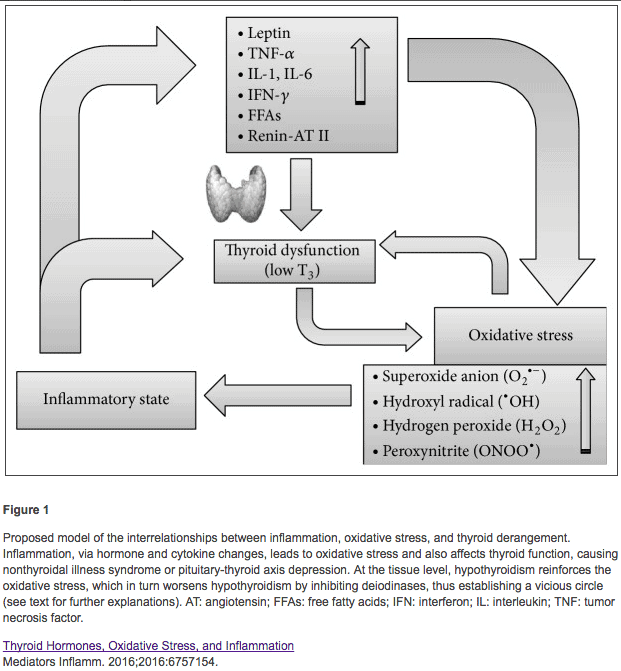
The connection between thyroid disease and PCOS is very important because hypothyroidism makes all of the symptoms of PCOS worse and there is an emerging relationship between these two conditions in the literature (7).
Better Options…
So what can you take or what can you do if metformin isn’t working for you?
There happen to be some very helpful and newer medications that have come out recently that show special promise in treating patients with PCOS.
I can vouch for the efficacy of these medications and I use them on my PCOS spectrum patients with great results.
I can tell you from first-hand experience that these medications are far more powerful than metformin at reducing insulin levels AND helping with weight loss.

They also can help improve and reduce androgen levels (DHEA and testosterone levels).
It’s important to realize that these medications are usually used off-label for PCOS.
The reason is that they are FDA-approved for treating type II diabetes, not necessarily for treating PCOS.
But if you understand the pathology and etiology of PCOS then you understand exactly why these medications are so helpful.
Because they are FDA-approved for type II diabetes many physicians may not be aware of how helpful they can be, which means it’s up to you to look into them and be your own advocate.
GLP-1 Agonists
First on the list is the GLP-1 agonists.
I haven’t been shy about why I like this class of medications.
Why?
Because they work so well and represent an accidental discovery of why exactly so many patients gain weight and have weight loss resistance: the combination of hyperglucagonemia and hyperleptinemia.
These medications were designed to treat blood sugar issues but they help in so many other ways.
But the relevant topic here is weight loss.
So do GLP-1 agonists help with weight loss?
Yes, and the studies confirm this (8):
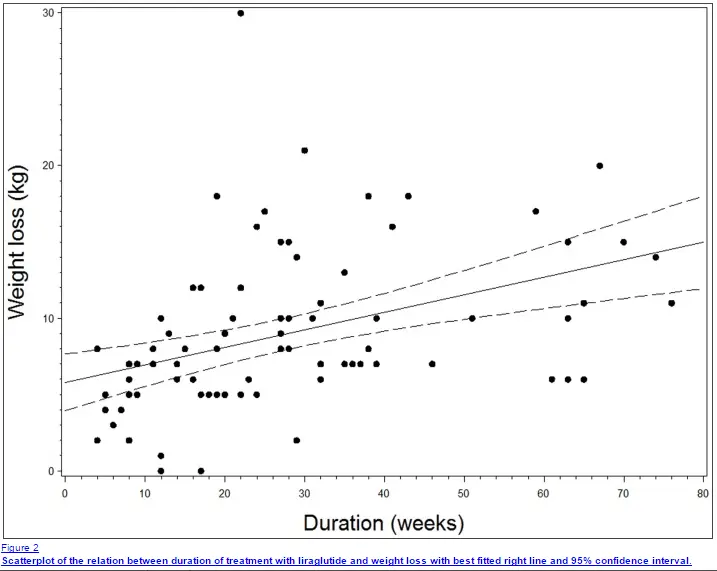
Studies have shown that the longer you take this medication the more weight loss you have, up to as much as 20 kgs (40+ pounds).
If you’ve read my case studies you know that this is actually true and I’ve shown it previously.
But things get even more interesting the deeper you dig:
Take for example this study (9).
It showed that patients taking metformin did experience some weight loss (around 1-2 pounds which I find to be accurate nowadays).
It compared a GLP-1 agonist by itself to the combination of metformin plus the GLP-1 agonist which resulted in significant weight loss over either medication alone.

What’s even more interesting is that this weight loss occurred in patients who had previously FAILED metformin monotherapy (10).
This means they took patients who previously took metformin but didn’t lose ANY weight, and they put these patients on the combination of metformin plus GLP-1 agonist and they did, in fact, lose weight.
This is important because patients who don’t lose weight on metformin are considered to be more resistant than others (and therefore more difficult to treat).
Chances are high that if you are reading this article you are likely also difficult to treat – otherwise, you wouldn’t have a need to look for an alternative!
Outside of the positive benefits that these medications have on weight loss they also have many other benefits.
Other benefits of GLP-1 agonists:
- Lowers and treats leptin resistance
- Treats glucagon-related issues
- Lowers androgen levels
- Dramatically helps with weight loss
- Helps improve metabolism over time
- Greatly reduces insulin and blood sugar levels
One of the reasons these medications are so helpful likely has to do with how GLP-1 agonists benefit other hormones in your body.
One final note:
In order to get the kind of results I am talking about here you have to make sure you are using the right type of GLP-1 agonist and at the right dose.
Most physicians don’t know how to dose, titrate, or use these medications for PCOS.
You can find more information about how I use these medications, how to titrate your dosing, and how to adjust dosing for the most benefit in my weight loss and hormone mastery guide.
Supplements to reduce Insulin Resistance
To get the best results and the most weight loss, you will need to use a combination of therapies.
What does this mean for you?
You shouldn’t expect significant weight loss by simply taking medication.
If you are serious about getting results then you will need to use a combination of supplements, medications (combinations of medications), and dietary changes.
Simply taking medication will NEVER result in reversal or even dramatic improvement in your PCOS symptoms.
Here we will discuss relevant supplements that can actually dramatically reduce insulin resistance and can safely be used with metformin (or GLP-1 agonists).
I’ve written about other supplements that can help PCOS patients here.
Supplements that help lower insulin levels in patients with PCOS:
- Alpha lipoic acid: ALA helps sensitize your body to insulin and can help lower blood sugar levels. If you have PCOS you will want to use up to 2,400mg per day in a sustained release form for best results. The length of treatment time should be around 6 months. You can read more about how ALA helps with weight loss here.
- Berberine: Berberine has been shown to reduce hemoglobin A1c as much as metformin (which means it’s very effective) and has also been shown to help with weight loss in patients with insulin resistance. Use up to 2,000mg per day for best results and for at least 4 months. Read more about how to use berberine for weight loss here.
- Glucomannan: This viscous fiber helps reduce the absorption of carbohydrates into the bloodstream, helps reduce your appetite, and reduces spikes in insulin levels. Use 4 tablets 15 minutes before a meal with a large glass of water for best results (use 3-4x per day).
- Fish Oil: Fish oil can lower insulin resistance by lowering inflammation and directly lead to weight loss and an increase in lean muscle mass if used at high enough dosages. You will want to use 2-4 GRAMS per day to get this benefit, which means 2,000 to 4,000mg of high-quality fish oil per day (more info below).
Part of the reason that patients don’t get results is that they don’t use high-quality supplements and they don’t use a high enough dose.
If you are serious about results then you need to use these supplements as indicated above.
Also, because inflammation plays a special role in PCOS I’ve also gone into more detail regarding fish oil.
Why?
Because fish oil has been shown to reduce inflammation, directly reduce fat mass, and build up lean muscle mass.
Diets to help reduce Insulin Resistance
Beyond taking supplements and medications you can and should also be trying to change your diet.
That means taking an active approach and consciously changing your diet to exclude the types of foods that spike insulin and make PCOS worse.
The type of diet you choose is less important than you think as long as you stick to some basic categories.
First: You should avoid all sugar.
Second: You should avoid all processed foods.
Third: You should eat organic and grass-fed whenever possible (as someone with PCOS you want to avoid any excess artificial growth hormones)
Fourth: You should tailor the number of carbohydrates and protein you eat to your body type and your leptin/insulin levels.
As long as you stick within these basic rules you can manipulate any base diet to meet your needs.
To give you a good starting point you can try any of these diets:
- Paleo diet
- Autoimmune Paleo diet (helpful if you have Hashimoto’s or other Autoimmune diseases)
- Ketogenic diet
- Whole 30
You will want to start with one diet and then adjust how much, how often, and your macromolecule ratios based on your specific needs.
Again, you can find more information on how to do this in my hormone mastery guide.
Wrapping it up
The bottom line:
Metformin can help patients with PCOS lose weight, but it’s not the best nor most effective medication.
If you are serious about treating your PCOS symptoms you need to put the majority of your focus on insulin resistance.
And that means a combination of taking the right type and dose of medication, changing your diet, and taking the right type and dose of supplements.
By doing these things it will be possible for you to lose weight and start feeling better.
Now I want to hear from you:
Do you have PCOS?
Have you taken metformin?
Has it worked for you? Why or why not?
Leave your comments below!
Scientific References
#1. https://www.ncbi.nlm.nih.gov/pmc/articles/PMC3277302/
#2. https://www.ncbi.nlm.nih.gov/pubmed/15886247
#3. https://www.ncbi.nlm.nih.gov/pmc/articles/PMC3607889/
#4. https://www.ncbi.nlm.nih.gov/pubmed/21146883
#5. https://www.ncbi.nlm.nih.gov/pubmed/23981104
#6. https://www.ncbi.nlm.nih.gov/pubmed/2291838
#7. https://www.ncbi.nlm.nih.gov/pmc/articles/PMC3832324/
#8. https://www.ncbi.nlm.nih.gov/pubmed/25885106
#9. https://www.ncbi.nlm.nih.gov/pmc/articles/PMC4145240/
#10. https://www.ncbi.nlm.nih.gov/pmc/articles/PMC3922503/
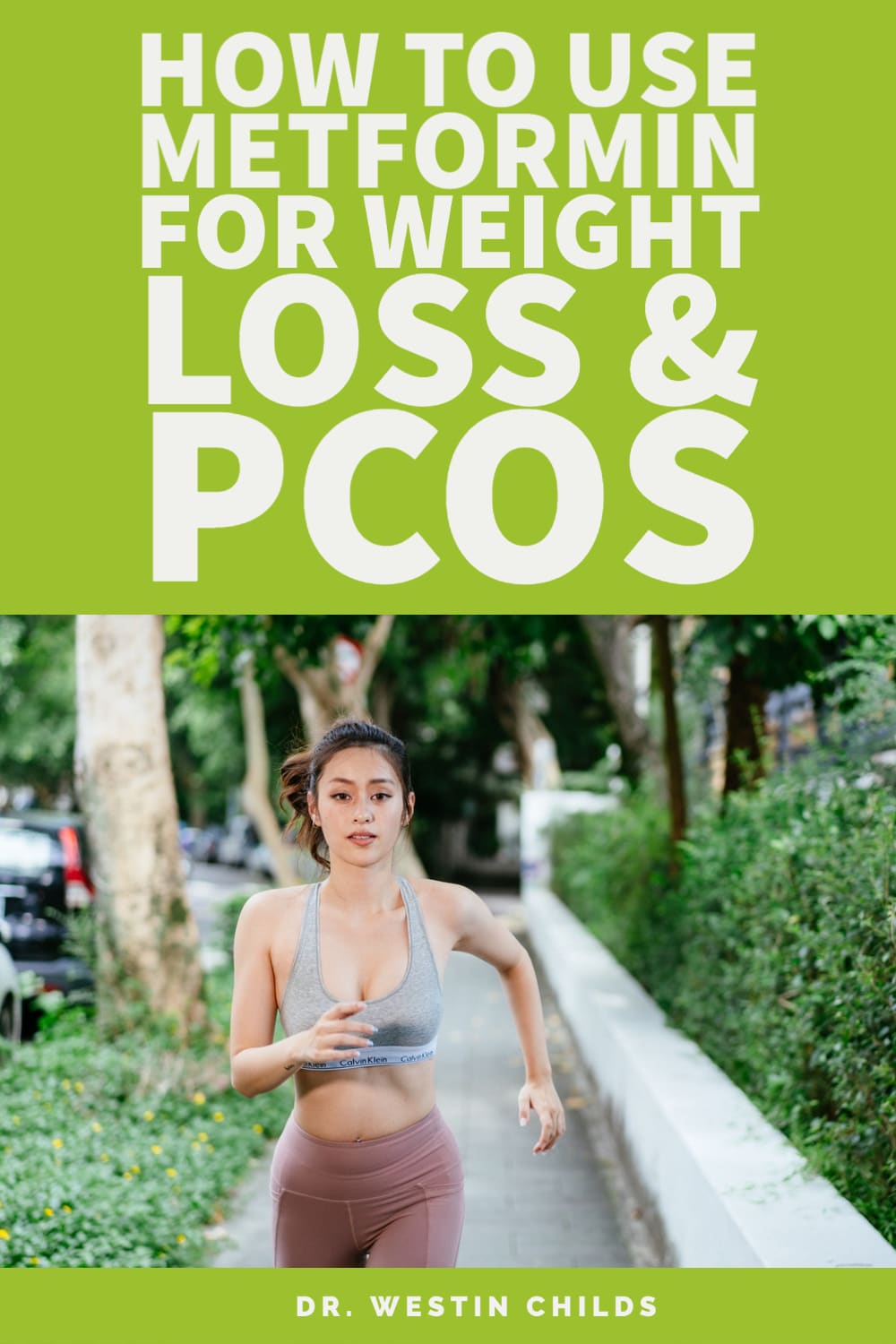






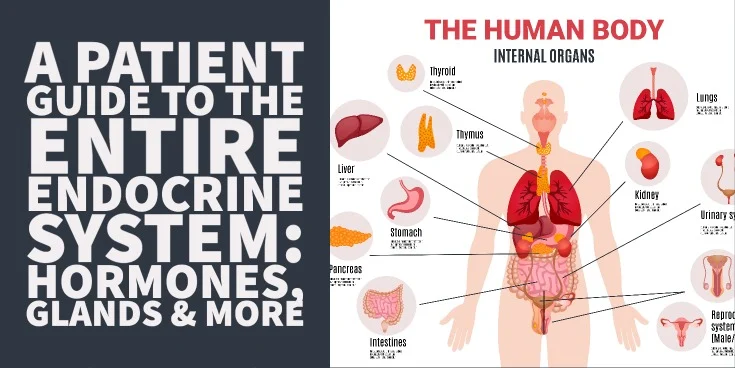

Hi Dr. Childs!
In this article, you linked 2 different fish oils…which do you recommend for PCOS- Dr. Mercola Krill or Pure Encapsulations?
Thank you!
Hi Lauren,
If you have inflammation then the mercola supplement is probably better, if not then you can stick with the pure encapsulations.
I’m not exactly sure if I have inflammation! I have hypothyroid (non Hashimoto’s) and PCOS…
Then either will likely work.
I have been taking taking Metformin for a long time. I have lost a good amount of weight but I have never added supplements. I have just ordered Golo a dietary supplement for the insulin resistance. I haven’t started it yet because they say chromium decreases Metformin. I am confused. My doctor has never said anything about this new med either.
Hi Stephanie,
Supplements that target insulin resistance can be added to metformin therapy. The synergy between the two should outweigh any small (and potential) reduction in absorption of your metformin.
Thanks for the info. I wish I would have know about these supplements a long time ago. I can’t do all 7, but I think the chromium combo and the zinc combo is good to start. Again those are all ok to take with metformin?
Hi Stephanie,
Yes, they are all okay to take with metformin.
I was diagnosed a while ago and I haven’t been able to lose weight. I have done tons of research and came up with a supplement concoction that seemed to be working but it was a lot of pills, money, planing,etc. Isn’t there a product or package I can purchase what has all the needed supplements in one? Like packages of daily dosages or something like that?
Hi Yuly,
It’s hard to say because I’m not sure which supplements are actually working for you (remember that each person is different so what works for you may not work for other people).
Very interesting article! Thanks for the info. I take metformin for PCOS and have lost weight– though I didn’t necessarily need to lose much– primary use is for fertility. What happens if/when I discontinue metformin? Will I gain the weight back?
Hi Nora,
This largely depends on why it helped with weight loss to begin with. In a perfect world you would have treated the underlying cause that resulted in weight gain with the medication so when you stop taking it you won’t regain the weight. This only happens some of the time in the real world.
Hi Nora,
I am about to be put on Metformin for fertility. I’m curious if you know if your hormone levels have leveled out? Or if you have had any luck getting pregnant yet. I know it hasn’t been long since you posted but was just curious if you’ve seen results! Good luck!
Good Afternoon Dr. Childs, I am struggling with a lot of back and forth miscommunication between my doctors. I am currently 29 and trying to conceive, we have been trying for 3 years now. I was diagnosed with PCOS about 4 years ago (I’ve honestly always had it, was just on BC so you couldn’t “tell”). Since they took me off BC I gained 40 lbs in less than 2 months. Yes 4O POUNDS. then they diagnosed me with PCOS and put me on metformin which stopped the weight gain, but did NOT aid in ANY weight loss. They started me at 500 and then slowly moved me up to 1,500. My periods started to regulate and while I was not losing any weight I was at least not gaining any and getting my periods. Fast forward to the beginning of this year I went to the endocrinologist for the first time because I was just exhausted all the time and I was referred to her. I was diagnosed with Hashimotos and now taking 50 mcg of Synthroid. I have been on it for almost a year now, they started me at 25 and then 3 months later increased it to 50 and my TSH and antibodies are good now. However, still no weight loss. I am not taking any supplements other than what is prescribed, for awhile I was but my numbers were just all over the place. My last lab work showed an increase on testosterone again (my last one showed normal testosterone levels). I tried keto diet for 3 months and did not lose one single lb. I did work out 4-5 times a week for a period of about 3 months and all I ended up with was a sciatic nerve flare up (which I had never experienced before) and throbbing joint pain. I eat really low almost no gluten, mostly dark chocolate if I want any sugars. Lots of protein and I do add bone broth protein to my shakes when I make myself a shake with veggies and fruit. I am at my wits end. I cant lose any weight no matter what “diet” I adopt. My husband and I want to be parents, but it seems at the turn of every corner we are hit with closed doors. I have a follow up with my endo next week and I will ask about switching to metformin XR. But other than that what do you think I should do. I am currently doing strength training (using my own weight for most of my work out) and lifting light weights for my arm workouts. I drink lots of water. As far as my levels my red cells are for the most part always too small, but I have been tested for all these kinds of anemia and all came back negative, my Vitamin D is for the most part almost always low as well. I would appreciate any of your input, my endo does not believe on supplements or on anything really… And my primary care said to stop keto as it was increasing my cholesterol? that is why I stopped it. Any help would be appreciated!!!!
Hi Ella,
The best way to figure out how to proceed is by finding a physician who can break down your history and check ALL of your hormones including sex hormones, cortisol, insulin and so on. Because each individual requires different treatment (including diet, exercise, etc.) it’s important that you find someone who can ‘look at the whole picture’.
Hello,
I read ovasitol can improve pcos symptoms. I stopped taking bc and my breast are now very small. Is Ovasitol and saw palmetto helpful treating pcos therefore increasing breast size?
Thank you for this. I have been searching for an article that connect PCOS and (pre)diabetes for a long time. I alalso have hypothyroidism. I am currently taking 500mg of metformin twice a day, eating a low carb diet, and started exercising again (I gave up many times due to no results before I was officially diagnosed with pcos)…but I’m gaining weight like crazy.. its scary how fast its coming on especially considering the effort ive put in.
I will be adding fish oils to my regimen. Thanks again for this article
Hi TA,
No problem and glad it helped! Keep us updated on your progress.
This article was very informative, thank you. I was diagnosed with pcos and insulin resistance 12yrs ago. I’ve been on metformin, which did nothing for me, byetta which caused bad side affects, Victoria, which was fabulous for weight loss, but caused my stomach to rarely empty and therefore caused issues. My latest med has been trulicity and it has worked miracles. My new problem is since I’m not actually a diabetic my insurance will no longer pay on it. So, my endo Dr has now prescribed Bydureon and says if insurance says no or wants a pa for it then all of my options have been exhausted and there’s nothing more I can do till I have diabetes. Does this sound right to you, or has my Dr just given up on my situation? What specific supplements would you suggest, as I couldn’t afford to do all and would they be safe with bydureon? Any help and advice is greatly appreciated!!
This is all very cool! You said, “Most physicians don’t know how to dose, titrate or use these medications for PCOS.” Are there any doctors or places that you recommend? or how to search for them? This process of elimination gets pretty complicated, and I feel that so many doctors that I’ve seen simply don’t understand what’s happening with my body.
I’d love to see someone who could sit me down and tell me about these kinds of options.
I was diagnosed with PCOS and insulin resistance when I was about 12 years old. I started metformin and meridia (which unfortunately is no longer available in the US) and I lost tons of weight really quickly and was healthy for about 10 years!!! Then I got pregnant and my insulin resistance came back with a vengeance. I started at about 140 lbs and got up to 215 lbs (with eating extremely healthy, hardly any pregnancy indulgences at all) Now at 2 months postpartum I’m still at 200 lbs and seem to be slowly gaining more weight. Just started on metformin and lots of supplements again and I’m praying it works again.
What type of metformin was used in this study? Is there a difference between extended release and regular immediate release metformin???
Which one do your recommend to try?
I would love my care to be taken over by you , where are you located and are you accepting new patients?
Hi Katie,
Unfortunately, I am not accepting any new patients! Sorry for the inconvenience.
By any chance Are you accepting new patients now?
Hi Kim,
Not at this time.
Hi Dr. Childs,
For patients who experience gastrointestinal side effects – Is the metformin slow release just as effective as normal metformin in regards to the benefits of reducing insulin resistance and helping PCOS etc?
Thank you,
Charlottte
Hi Charlotte,
Yes, the SR Metformin should be fine.
Hi! Would you mind addressing which of these medications and supplements are (or are not) safe to take during pregnancy? Thanks!
Hi Emily,
In general, it’s best to avoid weight loss medications during pregnancy. In terms of vitamins, it’s usually safe to consume water-soluble vitamins and to stay away from excess Vitamin A. If there’s ever a question as to whether or not you should be using something you should discuss that with your ob/gyn. You’ll find that most people take the “better safe than sorry” approach to treatments during pregnancy.
Thanks so much for this article. I’m type 1 diabetic with PCOS. I was diagnosed with PCOS when I was early 20’s and T1D when I was 25 (after having my first child). It took me 5 1/2 years to get pregnant with my 2nd child, but fortunately did! Over the past 3 years I’ve noticed considerable weight gain (from 120 lbs – 160 lbs). I live an active lifestyle and eat well. My insulin needs have also increased. My dr started me on metformin due to my PCOS, weight gain, acne and high testosterone levels. Still finding it nearly impossible to lose weight. I’m hoping I can bring this info up to my endo and we can come up with something that will help. I’m wondering if you’ve seen similar results for T1Ds with PCOS?
Hi Theresa,
You may have similar results, it just depends on how much insulin resistance you have (how much insulin you are taking). The goal would be to increase insulin sensitivity to help decrease your dose of insulin required which would help with weight loss.
What a well written article! I think I have pcos and am going to bring this article to my doctor. I understand so much now!
Hi Anna,
No problem! I hope it helps.
Hi Dr. Childs,
Do you have luck getting your GLP-1 agonists approved by insurance for your PCOS patients? They are an amazing class of drugs, but the GLP-1s are very expensive compared to metformin if they are not covered by insurance.
Hi Sarah,
I’m usually able to get them covered but it can take some work. Some 10-15% of patients will probably have to pay out of pocket, though.
I started to take Meformin about 3 weeks ago, feel amazing however how do I know what the correct dose is? Past few days I’ve been feeling a little like before I started, tierd, achy, not being able to sleep. I am currently on 500mg twice a day.
Hi Aisha,
Metformin doesn’t really help those issues so I’m thinking you feeling better is probably unrelated or just coincidence. The dose generally depends on your blood sugar and insulin level and gastric distress.
Hi Dr. Westin,
I took metformin extended-release in combination with no carbs no sugar diet years ago. Three doses of 500mg were recommended. I lost 40lbs in 4 months, but I felt nausea, stomach cramps, dizziness, and vomited frequently. I finally passed out one night on my way to run to the bathroom to vomit. After an emergency room visit chipped teeth and stitches I was much more cautious and took a lower dosage. I was so fortunate to get pregnant and have a baby. Now that my child is a toddler I was finally ready to try again since I have about 25 lbs to lose. I can not tolerate even two 500mg of metformin and not feeling well with work, family, and busy schedule is not easy. I have been trying everything I did in the past but am not losing any weight like the last time. I just feel awful. Did my body change after delivery? My physician doesn’t know much about PCOS he writes me an RX because I ask for it but he tells me you know this is not for weight loss. I read in your article that for best results you need to take 1,500 or more for best weight loss results. Do most people really tolerate that much without these side effects? Also, I wanted to know does it matter if you take regular metformin or extended-release? Which one was used in these studies? I would really like to find something that works for me that I can tolerate maintaining for long term. How can I find a PCOS specialist in my area since my ob-gyn and physician can’t help me?
I am a 69 yr. old woman. I was diagnosed about 35 yrs ago with PCOS. The doctor did surgery and sliced my ovaries like pies. I had a hysterectomony about 5 yrs. later. Since my ovaries were removed, does that mean that I still have pcos. I am now a diabetic for 10yrs or longer and I am about 30 lbs over weight. Cannot seem to lose any weight. I have been taking metformin for about 7 yrs and still have not lost anything . Would you say metformin and berberine will work for me ? Thanks Phyllis
What about those of us allergic to seafood who can not take fish oil or shellfish supplements?
Hi Kerry,
There are still plenty of other supplement options available for those who are allergic to shellfish and/or who can’t tolerate fish oil.
Hi Dr. Childs,
I have PCOS (age 46) and have never been on Metformin. Actually, none of my doctors have even offered it as a treatment. I would like to try it since both my mom and sister have had success with weight loss on it. Can I go to my general practitioner or do I need to see a specialist for this?
Thanks,
Laurie
Hi Laurie,
You should be able to get it from your general practitioner. It’s a very common medication and most doctors are very familiar with it.
What is a GLP Agonist?
Hi Phil,
It’s a class of medications called glucagon-like peptide-1 agonists. An example would be Victoza: https://www.restartmed.com/victoza/
Hello! I have been diagnosed with PCOS and insulin resistance. However, after doing blood work, my insulin and A1C is still within range. For weight loss help I took inositol, the Jarrow formula you recommended, however I noticed I gained 10 pounds with bloating, which was unusual for me. Do you have any idea why this could have happened? Thanks!
Hi Natasha,
It’s possible that it may have impacted your menstrual cycle and caused weight gain at that time. Most of the time, weight gain in women happens as a result of changes in hormone balance and is usually not directly from fat mass but from water weight/retention. In addition, sometimes therapies that improve the menstrual cycle cause some unwanted changes as you start them.